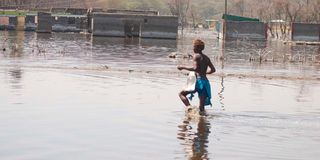Minority communities sue state over rising lake waters

A man walks deep into water for fishing near the submerged houses belonging to families displaced by the swelling Lake Nakuru in Barut in Nakuru city on January 27, 2022. Affected communities have moved to court to sue the government over the phenomenon
Minority and marginalised communities around Lake Baringo have asked a court to compel the government to accept responsibility for the negative effects of climate change and global warming.
Some 66 individuals from the Ilchamus and Tugen communities and Kituo Cha Sheria want the Environment and Land Court to hold the government liable for losses and damage caused by the lake’s rising waters.
They want officials to mitigate the adverse effects of climate change, including compensating locals for loss of homes and their livelihoods.
They allege that the government and its agencies failed to protect the communities against the effects of climate change that had been predicted by experts.
Through their lawyer, Robert Owino Omondi, they say they are a marginalised group with extremely vulnerable members such as children, women, youths, and people with disabilities who lived in Bartum and Il Ng'arua locations on the shores of the lake.
Sometime in November 2019, they claim, Lake Baringo’s waters started rising with increased rainfall and inflows from the rivers Molo and Pekera.
And by May 2020 the water levels had risen to unprecedented levels, submerging grazing and agricultural fields and road infrastructure, homes, hospitals, schools and business premises.
The flooding, they say, displaced the population and increased human-wildlife conflicts, led to an outbreak of cholera and typhoid and increased cases of malaria.
A government task force created in 2020 to investigate the causes of the rising waters blamed climate change.
The team’s reports also confirmed the devastating effects of flooding and recommended the actions the government could take to mitigate them.
But the government failed or refused to come up with adaptation strategies such as establishing early flood warning systems and protecting riparian areas along the rivers.
"The respondents being state officers and institutions responsible for all matters relating to the environment and climate change have denied, violated and threatened to continue violating and infringing on the petitioners’ fundamental rights and freedoms …,” the petitioners say in court documents.
In an affidavit sworn by Kituo Cha Sheria executive director Annette Mbogho, the group says the government should be held entirely responsible for the losses and damage suffered by the communities.
The group says the government failed to take appropriate steps to build the capacity of the petitioners to protect themselves.
The petitioners want the matter forwarded to the Chief Justice to empanel a three-judge bench to hear it.
They have sued the Cabinet secretaries for Environment; Transport and Infrastructure; and Lands and Physical Planning. Also sued are the National Environment Management Authority, the National Land Commission and the Attorney-General.
They want the court to compel the government to identify, compensate and settle individuals affected by the flooding.
They also want the court to order the government to rehabilitate and restore damaged infrastructure and the degraded environment.





